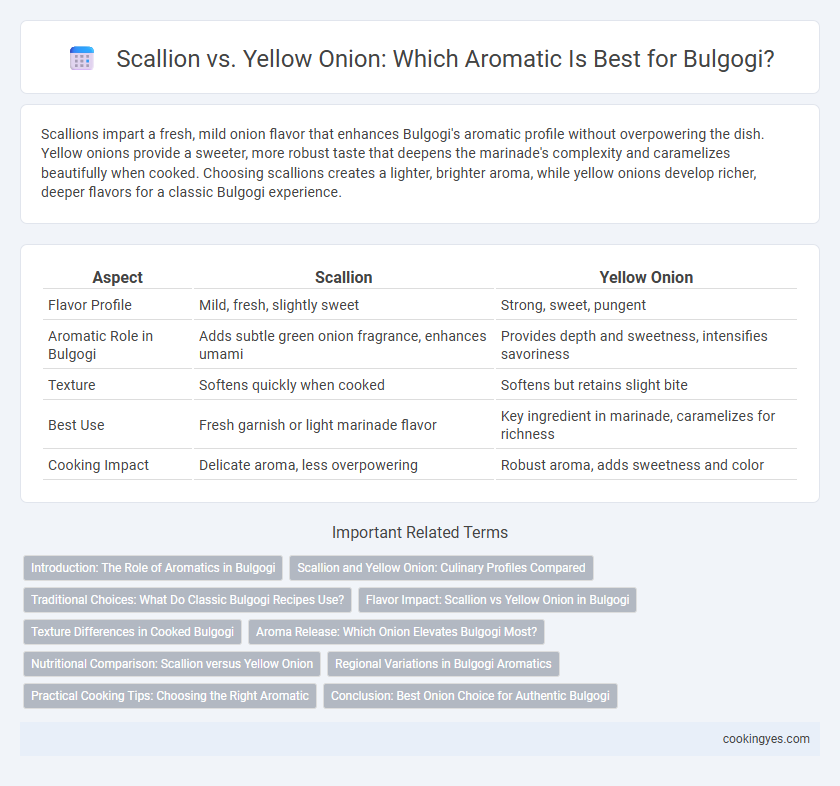Scallions impart a fresh, mild onion flavor that enhances Bulgogi's aromatic profile without overpowering the dish. Yellow onions provide a sweeter, more robust taste that deepens the marinade's complexity and caramelizes beautifully when cooked. Choosing scallions creates a lighter, brighter aroma, while yellow onions develop richer, deeper flavors for a classic Bulgogi experience.
Table of Comparison
| Aspect | Scallion | Yellow Onion |
|---|---|---|
| Flavor Profile | Mild, fresh, slightly sweet | Strong, sweet, pungent |
| Aromatic Role in Bulgogi | Adds subtle green onion fragrance, enhances umami | Provides depth and sweetness, intensifies savoriness |
| Texture | Softens quickly when cooked | Softens but retains slight bite |
| Best Use | Fresh garnish or light marinade flavor | Key ingredient in marinade, caramelizes for richness |
| Cooking Impact | Delicate aroma, less overpowering | Robust aroma, adds sweetness and color |
Introduction: The Role of Aromatics in Bulgogi
Scallions enhance bulgogi with a bright, fresh aroma that complements the sweet and savory marinade, creating a distinct Korean flavor profile. Yellow onions provide a deeper, caramelized sweetness when cooked, enriching the dish's umami complexity. Both aromatics are essential in balancing bulgogi's taste, but scallions emphasize freshness while yellow onions emphasize depth.
Scallion and Yellow Onion: Culinary Profiles Compared
Scallions provide a mild, fresh, and slightly sweet flavor that enhances bulgogi's savory profile without overpowering it, while yellow onions deliver a deeper, caramelized sweetness when cooked, enriching the dish's umami character. Scallions maintain a subtle crunch and bright green color, adding visual appeal and textural contrast, whereas yellow onions soften significantly, contributing to a tender, melting consistency. Choosing scallions or yellow onions for bulgogi aromatics depends on the desired balance between delicate freshness and robust sweetness in the final dish.
Traditional Choices: What Do Classic Bulgogi Recipes Use?
Classic bulgogi recipes traditionally emphasize the use of yellow onions for their sweet, mellow flavor that deeply caramelizes during cooking, enhancing the dish's rich umami profile. Scallions are often reserved as a fresh garnish or mixed into the marinade for a subtle sharpness and vibrant green color, rather than as a primary aromatic ingredient. This combination preserves the balance of savory and sweet notes essential to authentic bulgogi flavor.
Flavor Impact: Scallion vs Yellow Onion in Bulgogi
Scallions impart a fresh, mild onion flavor with subtle sweetness to bulgogi, enhancing its delicate umami profile without overpowering the marinade. Yellow onions contribute a deeper, caramelized sweetness and a robust aromatic base that intensifies the savory richness of the beef. Choosing scallions results in a lighter, brighter flavor, while yellow onions produce a heartier, more pronounced bulgogi aroma.
Texture Differences in Cooked Bulgogi
Scallions provide a tender, slightly crisp texture in cooked bulgogi, complementing the thinly sliced beef without overpowering its tenderness. Yellow onions develop a softer, caramelized texture that adds a rich, sweet depth but can sometimes mask the meat's natural juiciness. Choosing scallions maintains a light, fresh bite, whereas yellow onions contribute to a more indulgent, mellow mouthfeel.
Aroma Release: Which Onion Elevates Bulgogi Most?
Scallions release a fresh, mild aroma that enhances bulgogi's savory depth without overpowering its delicate balance, while yellow onions emit a richer, sweeter scent that intensifies the dish's caramelized undertones. The sulfur compounds in yellow onions break down during cooking, producing a robust fragrance ideal for bold bulgogi flavors, whereas scallions contribute subtle, green notes that elevate the marinade's complexity. Choosing between scallions and yellow onions depends on whether a lighter, crisp aroma or a deeper, sweeter onion essence is desired to best complement the marinated beef.
Nutritional Comparison: Scallion versus Yellow Onion
Scallions offer a higher vitamin K content and provide more delicate, fresh flavors compared to the pungent and sweeter taste of yellow onions in bulgogi. Yellow onions contain more quercetin antioxidants and have a higher fiber count, which contributes to digestive health and inflammation reduction. Incorporating scallions can boost vitamin A and C intake, while yellow onions enhance bulgogi with sulfur compounds beneficial for heart health.
Regional Variations in Bulgogi Aromatics
Scallions are predominantly used in Seoul-style bulgogi, imparting a fresh, mild onion aroma that complements the sweet and savory marinade, while yellow onions are favored in the Gyeongsang region, adding a deeper, caramelized sweetness to the dish. These regional variations in aromatics reflect local tastes and ingredient availability, with scallions enhancing brightness in northern recipes and yellow onions providing a richer, heartier flavor in southern preparations. The choice between scallions and yellow onions significantly influences the bulgogi's overall flavor profile and texture, contributing to its regional identity.
Practical Cooking Tips: Choosing the Right Aromatic
Scallions provide a fresher, milder flavor that enhances bulgogi's sweetness without overpowering the marinade, while yellow onions offer a deeper, caramelized sweetness when cooked that complements the beef's richness. For quicker cooking methods, scallions maintain their crispness and bright aroma, making them ideal for stir-fried bulgogi. When slow-cooking or grilling, yellow onions caramelize and infuse the dish with a robust, savory depth, optimizing the overall aromatic profile.
Conclusion: Best Onion Choice for Authentic Bulgogi
Scallions provide a milder, fresher flavor that enhances the natural sweetness of bulgogi without overpowering the dish, making them ideal for a more authentic aromatic profile. Yellow onions offer a stronger, caramelized essence when cooked, adding depth but potentially masking the delicate marinade nuances. For genuine bulgogi, scallions are the preferred onion choice, preserving the dish's traditional savory balance and enhancing its signature aroma.
Scallion vs yellow onion for bulgogi aromatics Infographic

 cookingyes.com
cookingyes.com